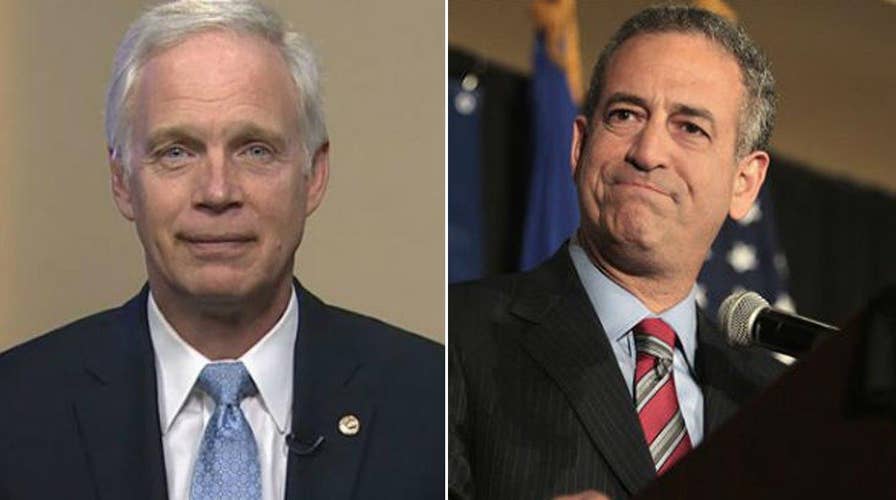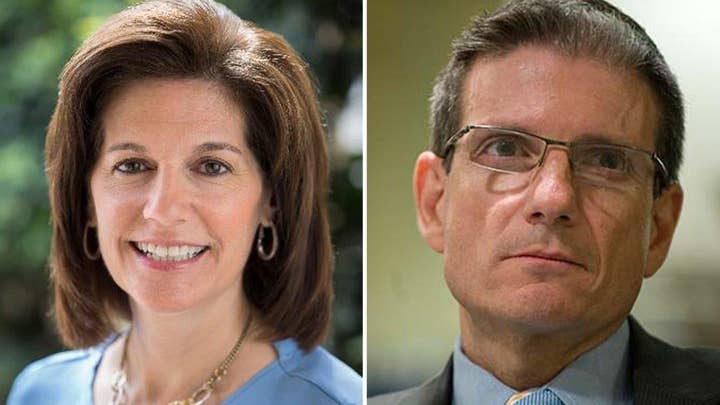Sen. Johnson: Feingold's entire campaign has been false
On 'America's Election HQ,' lawmaker explains why he is locked in a tight race with his opponent in Wisconsin
The presidential battle isn’t the only 2016 contest pundits are reluctant to call: The races expected to decide which party controls the Senate remain dramatically close in the final hours before Election Day.
“It’s amazing how many of these races remain close,” Steve Murray, director of the Monmouth University Polling Institute, said. “I cannot predict who’ll win the Senate. The slightest shift in the electorate [or] polling errors could move any of these races from one candidate to the other.”
Republicans began fretting immediately after the 2014 congressional races that the party in the next go-round risked losing its Senate majority -- with the decisive, marquee matchups in New Hampshire, Nevada, North Carolina, Wisconsin and Pennsylvania likely a fight to the end.
Two years later, on the weekend before the election Tuesday, all five of those races are within 7 percentage points and appear too close to call.
The early predictions largely were based on the fact Republicans are having to defend 24 Senate seats, spreading the party thin on money and resources, with Democrats needing to win no more than five seats to retake control of the chamber.
Democrats also had early targets on Ohio and Wisconsin. But they might have to settle for a split.
Democratic challenger Russ Feingold, a former U.S. senator, poses a serious threat to unseat incumbent Wisconsin GOP Sen. Ron Johnson, in a very close race with millions of outside dollars pouring in late.
But in Ohio, GOP Sen. Rob Portman is now leading by double-digits on his way to a second term against Democratic challenger Ted Strickland.
Not all of the early predictions have come true, with a few wild card races emerging.
In Florida, Republican Sen. Marco Rubio launched an unexpected re-election bid after a failed White House run, which is spoiling Democrats’ hopes of competing for a Senate seat without having to face a GOP incumbent.
Rubio now leads challenger Democratic Rep. Tim Murphy, whom Republicans tagged as a privileged young man with an inflated resume, as Washington Democrats move their money to more competitive races.
And Republican Sen. Roy Blunt is facing the fight of his political life from an upstart Democrat with military experience who can assemble an AR-15 blindfolded.
Blunt is being forced to defend his political insider status, having been elected to Congress in 1996. His race with Missouri Secretary of State Jason Kander is deadlocked, despite Republican presidential nominee Donald Trump now leading Missouri by double digits.
Murray, whose group on Wednesday showed the race tied at 45 percent, said Blunt’s tepid, anybody-but-Hillary Clinton support for Trump “just isn’t good enough for the true believers.”
A Blunt loss would be a double-barreled blow to the GOP, considering he is a member of Senate leadership.
NEW HAMPSHIRE
Democrats liked their odds against GOP incumbent Kelly Ayotte, considering she is a first-term senator trying to appeal to the state’s notoriously independent electorate while staying loyal to her Washington Republican base and supporters like the National Rifle Association and the billionaire, libertarian-minded Koch Brothers.
Trump has arguably been the X-factor in essentially every congressional race -- with the Senate race in New Hampshire perhaps the most glaring example.
Ayotte, in her race with also-popular challenger Democratic Gov. Maggie Hassan, first said she’d support Trump but did not endorse him.
She then called Trump a “role model,” only to retract the statement after another offensive Trump comment, then totally withdrew her support.
Ayotte and Hassan remain deadlocked at about 46 percent, with Trump trailing Clinton, the Democratic presidential nominee, in the state by about 5 percentage points.
NEVADA
With Sen. Harry Reid, the top Senate Democrat, retiring after five terms, Republicans considered a bid for his open seat perhaps their best 2016 opportunity to add to their now 54-seat majority.
Republicans have a top-tier competitor in Rep. Joe Heck. But all the resources they’ve put into the race for a parting shot at Reid cannot change the fact that Nevada is liberal-leaning and anchored by the Las Vegas area, home to a large Hispanic population, which overwhelmingly supports Democratic candidates. The Democratic nominee is Catherine Cortez Masto.
INDIANA
Republicans also thought they’d keep the seat of retiring GOP Sen. Dan Coats, with a solid candidate in three-term Rep. Todd Young.
But former Democratic Sen. Evan Bayh’s surprise decision in July to enter the race -- with a $10 million war chest -- dampened GOP hopes.
Still the race remains surprisingly close, within a couple of percentage points, amid disclosures about Bayh’s profitable connections to K Street and Wall Street.
NORTH CAROLINA
As is Missouri, Republicans didn’t expect such a hyper-competitive race in North Carolina. Incumbent Sen. Richard Burr’s challenger, Deborah Ross, is a former American Civil Liberties Union lawyer and state representative, which gives her little state-wide name recognition.
However, the national backlash from a Republican-backed bill that essentially requires transgender people to use the bathroom that matches their birth gender has unexpectedly put Burr on the defensive.
The two-term senator is also running amid a federal appeals court ruling in July that struck down state voter ID laws that, according to the decision, suppressed voting among minorities.
Such controversies have also turned North Carolina into an unexpected potential pickup for Clinton, though the state has voted for the Republican nominee in 10 of the past 12 presidential elections. Clinton and Trump have made dozens of campaigns stops in the battleground state in the closing weeks of the race.
Meanwhile, Burr has created his own problems of late, having been recorded joking Saturday about a gun magazine not having a “bullseye” over a picture of Clinton’s face. Burr promptly gave an apology in a race that remains a statistical tie in its final days.
WISCONSIN
Feingold is back for a rematch, after losing his Senate seat in 2010 to Johnson.
Both candidates are running against historical odds: Not since 1934 has a U.S. senator won a rematch against the candidate who defeated him six year earlier. And the state has not elected a Republican senator in a presidential election cycle since 1980.
Republicans quietly had low expectations about keeping the seat, with Johnson among those after the 2014 midterms to publicly express concern about 2016.
“There's no doubt about it, it's going to be a bigger challenge,'' he said in December 2014, a few weeks after the GOP won control of the Senate.
Trump has also loomed large in this race, in which Feingold leads by about 6 percentage points. In the 2016 GOP primaries, Trump dashed the presidential aspirations of Wisconsin Gov. Scott Walker, popular within the state’s conservative base. And Trump’s controversial remarks eventually led House Speaker Rep. Paul Ryan, R-Wis., last month to stop campaigning for the nominee, though Ryan still plans to vote for Trump.
Last week, the Democrats’ Senate Majority PAC put $2 million into the race, which didn’t seem to shock political analysts. But they appeared to take notice Wednesday when Republican super PAC Senate Leadership Fund announced it would match the Democrats' investment and launched a new television ad attacking Feingold.
“This is a game changer because it means that Republicans see a path to victory for Johnson,” said Jennifer Duffy, who analyzes Senate races for the Cook Political Report.
PENNSYLVANIA
Republican Sen. Pat Toomey was another early, prime target for Democrats.
He’s a first-term Republican senator seeking reelection in a presidential year in Pennsylvania, which has voted for the Democratic nominee in the past six elections, despite its battleground status.
Washington Democrats’ handpicked candidate is Katie McGinty, a former Clinton administration adviser and chief of staff for Democratic Gov. Tom Wolf. But after a hard-fought primary that included former Rep. Joe Sestak, McGinty has run what some political analysts have called an uninspiring race.
“Hillary Clinton is leading in Pennsylvania in some polls by double digits,” political analyst Erin McPike recently told Fox News. “But it’s looking like voters are willing to split the ticket. It looks like Hillary Clinton is not going to be able to pull Katie McGinty over the finish line.”
Said Murray: “Neither Clinton nor Trump have good coattails.”
Toomey, a Republican who has backed Capitol Hill legislation on reforming firearms laws, has been endorsed by gun-control advocate former New York City Mayor Michael Bloomberg and the Americans for Responsible Solutions, a political action committee founded by former Arizona Rep. Gabby Giffords.
The race between the two Ivy League-educated candidates has already set a spending record -- more than $117 million from their committees and independent groups.













































